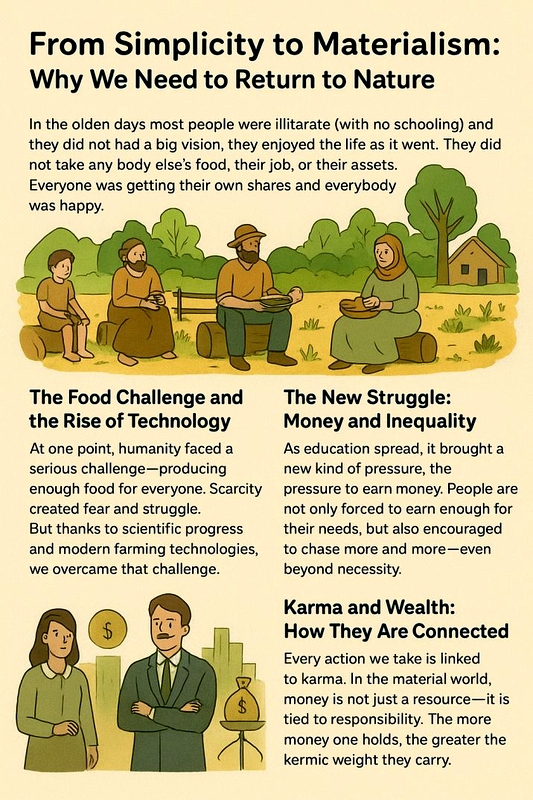🏠 / English blogs / 8
From Simplicity to Materialism: Why We Need to Return to Nature
Sept. 9, 2025, 6:36 p.m. Share it on WhatsApp
The Simplicity of the Olden Days
In the olden days, most people lived simple lives. Education and formal schooling were rare, and people did not carry large ambitions or complex visions for the future. They embraced life as it came.
There was a natural order: nobody tried to take away another person’s food, job, or assets. Every family had its share, every person had dignity, and there was contentment. Happiness did not depend on accumulation, but on living with what they had.
The Food Challenge and the Rise of Technology
At one point, humanity faced a serious challenge—producing enough food for everyone. Scarcity created fear and struggle. But thanks to scientific progress and modern farming technologies, we overcame that challenge.
Today, we produce more food than ever before—sometimes even more than we need. But while the food problem was solved, a new and deeper problem began to emerge.
The New Struggle: Money and Inequality
As education spread, it brought a new kind of pressure: the pressure to earn money. People are not only forced to earn enough for their needs, but also encouraged to chase more and more—even beyond necessity.
This has created an imbalance. In today’s system, one person can earn the money of 10, 20, or even 100 people. Jobs are concentrated, wealth is hoarded, and inequality is widening.
Statistics show that 90% of the people are fighting over just 30% of the money, while the remaining 70% of wealth is controlled by only 10% of the population. This is the harsh reality of capitalism.
Karma and Wealth: How They Are Connected
Every action we take is linked to karma. In the material world, money is not just a resource—it is tied to responsibility. The more money one holds, the greater the karmic weight they carry.
Think of food:
- Food is for everyone.
- If someone hoards more than they need, the law punishes them—because it stops the natural flow of food to others.
Now, money is directly linked to food. Without money, people cannot buy groceries, pay for farming, or prepare meals. If one person holds too much wealth, it prevents others from accessing even the basics.
This should also be considered a punishable offense. Yet, there is no law to set a top limit for money. The system allows endless accumulation, creating suffering for millions.
The Real Purpose of Money
Money was never meant to be stored in massive quantities. It was meant for circulation—for spending, for meeting needs, for enabling fair trade.
When people hoard wealth, they create poverty for others. Spiritually speaking, the more money you hoard, the more karma (or sin) you accumulate. By this measure, the world’s wealthiest individuals may also carry the heaviest karmic burdens.
Rethinking Education and Life
The purpose of education has been misunderstood. Education is not just about wealth creation or securing a high-paying job. Its true purpose is:
- To help us understand life.
- To teach us to live in harmony with nature.
- To create joy, peace, and balance.
When we shift our mindset from materialism to natural living, we rediscover what it means to be human.
Moving Toward a Nature-Oriented Life
How do we escape the trap of materialism? Here are a few steps:
- Limit Needs – Learn the difference between “need” and “greed.”
- Value Sharing – Ensure resources reach those in need, instead of hoarding.
- Respect Nature – Live in balance with the environment, not in conflict with it.
- Redefine Success – Measure life by health, peace, and happiness—not wealth.
- Spiritual Awareness – Recognize that every action has karma, and live responsibly.
Final Thoughts
The old way of living taught us simplicity, sharing, and satisfaction. Modern life, while advanced, has dragged us into a cycle of endless desire and inequality.
It is time to remember: life is not about accumulating wealth—it is about experiencing nature, finding peace, and living with dignity.
If we truly want happiness, we must shift from material life to a nature-oriented lifestyle. Only then can we heal ourselves and the world.

Last Updated on Sept. 9, 2025, 6:36 p.m.